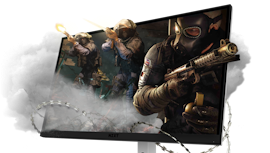N7 Z890
N7 Z890
Intel® Z890 ATX Gaming Wi-Fi Motherboard with Full Cover
Color:
Blanco
Compra a nuestros distribuidores.
Ver todos los distribuidoresResumen
Detalles
The N7 Z890 pairs advanced gaming performance with a sleek, refined design. Built for Intel® Core™ Ultra (Series 2) processors, it features robust power delivery, optimized thermals, and high-speed connectivity with Thunderbolt™ 4, DDR5, and PCIe 5.0. A full PCB cover enhances aesthetics, creating a clean and modern foundation for any build.
- Intel LGA 1851 Socket: Designed for Intel® Core™ Ultra (Series 2) processors, featuring an RL-ILM socket for reduced mounting pressure and improved thermal contact.
- Optimal Power: 16+1+2 power phase design with 80A DrMOS and a six-layer, low-loss 2-ounce copper PCB ensure stable power delivery.
- Thermal Management: VRM and PCIe 5.0 NVMe SSD heatsinks optimize cooling efficiency, keeping temperatures low during intense workloads.
- PCIe 5.0 Expansion: One PCIe® 5.0 x16 slot for GPUs and two PCIe® 4.0 x16 slots for additional high-speed expansion.
- High-Speed Storage: One PCIe® 5.0 and four PCIe® 4.0 M.2 slots deliver ultra-fast storage speeds, reducing load times and maximizing efficiency.
- DDR5 Memory: Four dual-channel DIMM slots support DDR5 RAM speeds of 8000+ MT/s, delivering faster multitasking and improved system responsiveness.
- Fast Connectivity: Thunderbolt™ 4, Wi-Fi 6E, and 2.5GbE enable high-speed data transfers and low-latency networking.
- Sleek, Minimal Design: A full PCB cover provides a clean, modern aesthetic that integrates seamlessly into any build.
IMPORTANT: BIOS & Driver Updates Required
Update your BIOS and drivers for the best compatibility, stability, and performance.
- BIOS: Ensure your motherboard is running the latest BIOS version for optimal system stability and hardware compatibility. You can check your BIOS version in NZXT CAM.
- Drivers: Keep your chipset and system drivers up to date for peak performance and reliability.
Find the latest updates below the FAQs. Need help? NZXT Support is here for you!
En el interior de la caja
N7 Z890 Motherboard1
SATA cables (2 x 90°, 2 x 180°)4
M.2 screws4
NZXT 8-pin splitter2
Wireless antenna2
User Manual1
Especificaciones técnicas
CPU
CPU:Intel® Socket LGA 1851 for Intel® Core™ Ultra Processors (Series 2)
Chipset
Chipset:Intel® Z890
Memory
DIMM Slots:4 x DDR5 only
Memory Architecture:Dual-Channel
Intel® Extreme Memory Profile (XMP) 3.0:Supported
OC Frequency:Please refer to Memory QVL on NZXT’s website (www.nzxt.com) for more information.
Expansion Slots
PCIe 5.0 ×16 slot (PCIEX16_1), supports ×16 mode:1
PCIe 4.0 ×16 slots (PCIEX16_2 & PCIEX16_3), support ×4 mode:2
M.2 Socket (Key E), supports Type 2230 Wi-Fi/BT PCIe Wi-Fi module and Intel® CNVio/CNVio2:1
Storage
M.2_1, Type 2280 (PCIe 5.0 ×4 mode):1
M.2_2, Type 2280 (PCIe 4.0 ×4 mode):1
M.2_3, Type 2280 (PCIe 4.0 ×4 mode):1
M.2_4, Type 2280 (PCIe 4.0 ×4 and SATA 6Gb/s mode):1
SATA 6Gb/s ports:4
LAN
LAN:Realtek® 2.5G LAN
Wireless
Dual-Band Wi-Fi 7:Supported
Bluetooth:v5.3
AUDIO
AUDIO:Realtek® ALC1220 Audio Codec
Rear I/O
Wireless antenna SMA connectors:2
HDMI™ port:1
Thunderbolt™ 4 ports:2
USB 3.2 Gen 2x2 Type-C® port:1
USB 3.2 Gen 2 ports:4
USB 3.2 Gen 1 Type-A ® ports:3
Clear CMOS button:1
LAN (RJ45) port:1
Audio jacks:2
Optical S/PDIF out port:1
Internal I/O
24-pin ATX power connector:1
8-pin ATX 12V power connector:2
4-pin CPU_FAN connector:1
4-pin AIO_PUMP connector:1
4-pin SYS_FAN connectors:3
NZXT RGB LED connector:1
5V ARGB LED connectors:2
NZXT 8-pin PWM connectors:2
USB 2.0 header (Up to 4 USB 2.0 ports):2
USB 3.2 Gen1 header (Up to 4 USB 3.2 Gen 1 ports):2
USB 3.2 Gen2x2 front panel header (For USB Type-C):1
Front panel audio connector:1
Power button:1
Reset button:1
Post LEDs:1
General
Operating System:Windows® 11/10 64-bit
Form Factor:ATX
Warranty:3 years
Model Number:N7-Z89XT-W1 (White) / N7-Z89XT-B1 (Black)
UPC:810074846264 (White) / 810074846271 (Black)
EAN:5056547206202 (White) / 5056547206219 (Black)
FAQs
Descargas
Documentación
Controladores
Gestiona el rendimiento, las temperaturas y los dispositivos desde una sola aplicación.
WINDOWS 10 DE 64 BITS
Ayuda y asistencia técnica
Consigue guías exhaustivas y asistencia para todos tus productos NZXT, así como ayuda sobre la garantía, las devoluciones y cualquier cuestión técnica.


